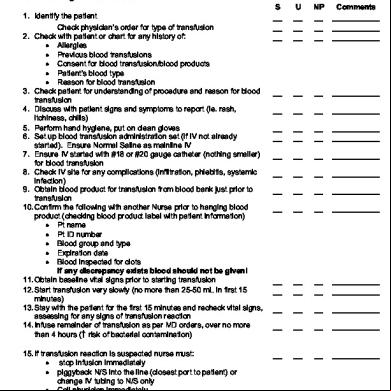S121 nre Study Guide 215c27
This document was ed by and they confirmed that they have the permission to share it. If you are author or own the copyright of this book, please report to us by using this report form. Report 3i3n4
Overview 26281t
& View S121 nre Study Guide as PDF for free.
More details 6y5l6z
- Words: 528
- Pages: 3
PREGRAD EXAM/ NRE Study Guide The NRE consists of Book 1 & Book 2, each book containing approximately 115 –125 objective type questions. One book will be written in the morning, the other book written in the afternoon. The Pregraduate Exam consists of Book 1 & Book 2, each book containing approximately 50 – 70 objective type questions. The entire exam will be written at one time. The questions on the Pregrad exam and the NRE will be a combination of independent and case study questions. The questions will test your knowledge/comprehension, application and critical thinking. Questions will take into client culture, variations in age group (care through the life span ), health teaching, therapeutic communication, variation in health setting ( institution and community ), interpretation of diagnostic interventions, pharmacological components of care ( health teaching, observations etc.), PN role in health and wellness promotion and illness prevention across the lifespan, psychomotor skills and client assessment. Pay particular attention to issues involving the nurseclient relationship, curative/ive care, rehabilitation, and professional practice. Topics to Review: Head to toe assessment, Nursing Process, Wound Infection, Decubitus Ulcers, Pain, Hemorrhage, Shock, STD’S, AIDS Cortisone Therapy, Anti – infective Drugs, Insulin Therapy, Anticoagulants, Cardiac medications and Antihypertensives. Cardiovascular – CHF, MI, Hypertension, Angina, PVD Endocrine – Diabetes Mellitus Type 11, Hypo/ hyperthyroidism Gastrointestional – Appendicitis, Peptic ulcer disease, Ulcerative colitis, Irritable bowel syndrome, Hepatitis, Cirrhosis of the liver Cholecystitis/cholecystectomy, Bowel cancer, Colostomy,
GI Bleeding, GI Infection (Paediatrics ) Hematologic – Anemia. Musculoskeletal – Osteoarthritis, Rheumatoid Arthritis (inflammatory disorders) Osteoporosis, fractures (skeletal disorders) Hip replacement Neurologic – CVA (vascular disorder) Alzheimer’s Disease, Parkinson’s Disease (degenerative disorders) Multiple Sclerosis (inflammatory disorder) Spinal cord injury, Head injury (traumatic disorders) Renal/ Urinary Incontinence and retention, Renal calculi, Renal failure Reproductive – Ca of cervix, Ca of breast, Prostate disease Respiratory – COPD (Asthma, Chronic bronchitis, Emphysema), SOB, Pneumonia (ABG’S), Tuberculosis Paediatrics – Growth and Development, Cystic fibrosis, Laryngotracheobronchitis (LTD), Croup Cerebral Palsy,Otitis media, GI infection Mental Health – Stress, Depression, Suicide, Schizophrenia, Bipolar Disorder, Psychosis, Eating disorders. Maternal & Newborn – Ante partum, Post partum, Newborn nutrition, Gestational diabetes, Hemorrhage, Breast Feeding Psychomotor Skills – TPR, Blood pressure Positioning and turning Math calculations, Oral medications, Instillation of ear drops, Topical meds, SC injections, IM injections, Flu injections, Enema, Application of heat & cold. IV Therapy, Blood Transfusions
Medical and surgical asepsis Wound care and dressings Sutures and clips Catherization, Bladder irrigation External urinary draining devices Preoperative and post operative care Substance Precautions Inhalation therapy, O2 therapy, Pulse oxometry Enteral feeds, NG feeds Colostomy care
Thorough review of the above topics should help you to be successful on your examination. When preparing to write the NRE, we recommend that you obtain the Canadian PN Prep Guide – edition 3. This is one of the most valuable resources for preparing for NRE. This book is available in the GBC Bookstore (approx $75). When preparing to write the NRE, you may also want to complete the Predictor Tests on line. There will be a charge for this test (approx $65). You can access this website at www.ASITest.ca or access the Predictor Test through cno.org
GOOD LUCK!!!
April 2009
GI Bleeding, GI Infection (Paediatrics ) Hematologic – Anemia. Musculoskeletal – Osteoarthritis, Rheumatoid Arthritis (inflammatory disorders) Osteoporosis, fractures (skeletal disorders) Hip replacement Neurologic – CVA (vascular disorder) Alzheimer’s Disease, Parkinson’s Disease (degenerative disorders) Multiple Sclerosis (inflammatory disorder) Spinal cord injury, Head injury (traumatic disorders) Renal/ Urinary Incontinence and retention, Renal calculi, Renal failure Reproductive – Ca of cervix, Ca of breast, Prostate disease Respiratory – COPD (Asthma, Chronic bronchitis, Emphysema), SOB, Pneumonia (ABG’S), Tuberculosis Paediatrics – Growth and Development, Cystic fibrosis, Laryngotracheobronchitis (LTD), Croup Cerebral Palsy,Otitis media, GI infection Mental Health – Stress, Depression, Suicide, Schizophrenia, Bipolar Disorder, Psychosis, Eating disorders. Maternal & Newborn – Ante partum, Post partum, Newborn nutrition, Gestational diabetes, Hemorrhage, Breast Feeding Psychomotor Skills – TPR, Blood pressure Positioning and turning Math calculations, Oral medications, Instillation of ear drops, Topical meds, SC injections, IM injections, Flu injections, Enema, Application of heat & cold. IV Therapy, Blood Transfusions
Medical and surgical asepsis Wound care and dressings Sutures and clips Catherization, Bladder irrigation External urinary draining devices Preoperative and post operative care Substance Precautions Inhalation therapy, O2 therapy, Pulse oxometry Enteral feeds, NG feeds Colostomy care
Thorough review of the above topics should help you to be successful on your examination. When preparing to write the NRE, we recommend that you obtain the Canadian PN Prep Guide – edition 3. This is one of the most valuable resources for preparing for NRE. This book is available in the GBC Bookstore (approx $75). When preparing to write the NRE, you may also want to complete the Predictor Tests on line. There will be a charge for this test (approx $65). You can access this website at www.ASITest.ca or access the Predictor Test through cno.org
GOOD LUCK!!!
April 2009










